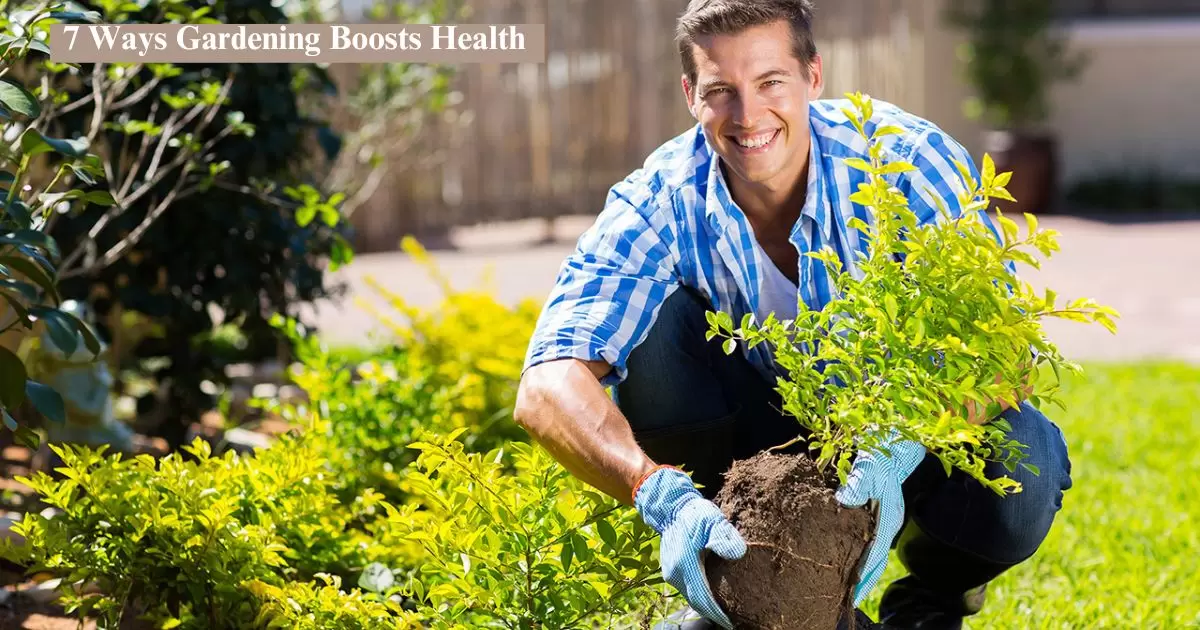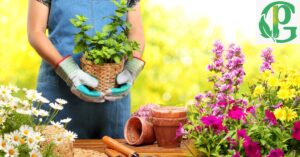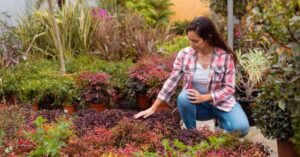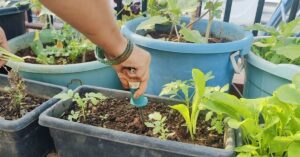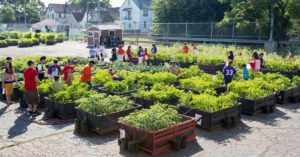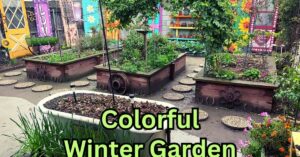Gardening is known to have many positive impacts on one’s overall well-being, as outlined in the list 7 Ways Gardening Boosts Health. Spending time in nature, enjoying some fresh air and sunlight, while performing tasks like weeding, watering plants, or harvesting vegetables and herbs, leads to reductions in stress levels as well as increases in both physical activity and nutritional intake.
1 – Enhance Sleep Quality
Gardening can help improve your sleep. Spending time outdoors doing light physical activity in the garden allows your body to relax. This helps you fall asleep more easily at night. Working in the garden also aligns your body with natural sunlight rhythms. Being exposed to sunlight during the day regulates your circadian rhythm which affects your sleep-wake cycle.
Stress and worry can make it hard to sleep well. However, studies show that spending time in nature doing activities like gardening is proven to reduce stress and anxiety. With a less cluttered mind, it becomes easier to fall asleep at night and stay asleep.
2 – Build Immunity
Regular gardening can boost your immune system in several ways. Any minor cuts or insect bites you get while gardening helps strengthen your body’s response to pathogens. This mild and regular exposure helps improve immunity. The microbes found naturally in the soil also stimulate your immune system in a safe and controlled way.
Homegrown fruits and vegetables from your garden are more nutritious than store-bought produce. They are richer in antioxidants, vitamins, and minerals that support optimal immune function. A diet focused on locally grown fresh produce has been shown to better fuel the immune system’s ability to keep you healthy.
3 – Find Stress Release
Being outside in nature, such as your yard or garden, has proven stress-reducing effects on both the mind and body. Gardening offers a calming, meditative activity that allows your mind to focus on the tasks at hand instead of rumbling thoughts. Physical activities combined with the beauty of nature’s scenery provide a sense of relaxation.
The creative process of nurturing plants and seeing new growth is satisfying. Taking care of living things helps relieve feelings of stress or anxiety. Simply put, spending time among plants and in green spaces helps melt stress away naturally.
4 – Cultivate Heart Health

Regular gardening is a moderate form of physical activity that strengthens the cardiovascular system over time. Even mild activities like weeding or watering provide exercise benefits. Outdoor movement avoids sedentary behaviors that can be hard on the heart.
Exposure to nature’s positive impact on mental well-being, such as reduced stress and boosts in mood, also supports heart health. Gardening Safe While Pregnant in natural sunlight, which cardiovascular patients are often encouraged to experience for benefits like vitamin D production and circulation support.
5 – Keep Health on Track
Gardeners tend to live more active lifestyles overall than non-gardeners. Making time every day for gardening activities keeps your calorie burn consistent. This helps maintain a healthy weight and fitness level.
A home vegetable or herb garden is a self-sufficient inspiration. Homegrown produce encourages more meals made from whole, minimally processed ingredients. A diet focused on nutrition from the garden supports wellness goals long term.
6 – Survey Your Property
Gardening provides a reason to explore the nooks and crannies of your landscape. Regular walks around property boundaries while planning or inspecting garden areas keep you active. Outdoor movement has mental health benefits as well.
Appreciating nature’s beauty in your own yard cultivates gratitude. Learning about plant and animal life on the property helps people feel connected to the environment. These perspectives support overall well-being and quality of life.
7 – Level up Your Gardening Knowledge
Avid gardeners continuously strive to expand their plant knowledge. Seeking information about growing conditions, cultivars, and techniques engages the mind. Troubleshooting challenges motivates learning.
Beginner gardeners take the first steps toward learning intricacies like plant identification, maintenance timing, and improving soil. Picking up handy skills resembles maintaining motivation for better health behaviors over time.
Try Gardening to Boost Your Health Today
Making gardening a regular activity, even just 30 minutes most days, provides mental and physical benefits. Beyond growing food, gardening is a way to relieve stress and connect with nature. Spending time nurturing plants outside nurtures the whole self. Overall wellness happens through small, consistent healthy habits.
Fertilizer Care Tasks in PlantTAGG
PlantTAGG helps users keep track of fertilization schedules for individual plants. Features allow entering types of fertilizer applied, preferred application rates, and follow-up reminders. Reviewing nutrient needs periodically is simplified.
How to Use Companion Planting in Your Garden
Certain plant combinations, known as companion planting, support each other in beneficial ways like pest protection or pollination. PlantTAGG enables gardeners to conveniently document which plant varieties work well together based on traits. Referring to past success makes planning easier.
Ruibal’s Plants of Texas and PlantTAGG Simplify Home Plant Care
The guide Ruibal’s Plants of Texas combined with PlantTAGG’s online plant care resources streamline landscape management. Key features help quickly identify existing plants while delivering tailored watering, pruning, and pest control reminders.
10 Plants That Help Deter Wasps from Your Patio and Garden
Some attractive foliage naturally deters wasps from outdoor living areas. PlantTAGG lets members take note of which repellent flowers or shrubs flourish locally. Recalling past results helps select strategically when repurchasing perennials.
How the newly launched PlantTAGG helps backyard gardeners grow through tech
PlantTAGG recently released its web and mobile applications to provide 21st-century digital tools for successful home horticulture. Features allow for identifying unknown plants, accessing growing guides, and organizing plant care calendars.
PlantTAGG Simplifies Home Plant Care via Mobile

PlantTAGG’s convenient app allows gardeners to photograph plants right in their yard for on-the-spot identification. Mobile access from anywhere gives anyone green thumbs by fulfilling plant care needs anytime, anywhere.
3 Things You Need to Know About Fertilizers to Get the Yard of Your Dreams
Key factors that impact results from fertilizer include nutrient contents, correct application procedures, and properly timed feedings tailored to each plant’s individual needs at its growth stage. PlantTAGG’s guides on fertilizing make achieving yard goals achievable.
How to Create a Beautiful Shade Garden
PlantTAGG supports homeowners in developing soothing shaded gardens by selecting tolerant native species. Features provide design layout inspiration using shade-loving perennials, ferns, and ornamental grasses in any area receiving partial sun.
8 Steps to Take for the Perfect Flower Garden
Use PlantTAGG’s checklist to prepare the flower bed correctly from the start, including soil improvements and picking long-blooming varieties sure to delight. Strategic planning leads to success with colorful, thriving blooms all season.
How the Daily Weather Impacts Your Home Garden
PlantTAGG members gain helpful insights for tackling tasks. The service provides hyperlocal rainfall data and forecasts so plant health can be optimized based on current and predicted conditions like drought, storms, or temperature fluctuations.
Fertilizer Care Tasks in PlantTAGG
Gardeners can rely on PlantTAGG to simplify fertilizing routines through customizing nutrient programs. Key functions involve indicating which products supply macro and micronutrients for plants, proper amounts, and scheduled reapplications targeted to each plant’s needs at different stages.
How to Use Companion Planting in Your Garden
Certain plant groupings excel when placed near each other due to allelopathy, the natural release of chemical compounds. PlantTAGG’s guides on companion gardening refer back to previous seasons’ tried-and-true combinations that showed symbiotic pest and pollinator support without negative side effects.
Ruibal’s Plants of Texas and PlantTAGG Simplify Home Plant Care
On-the-go mobile ID capabilities combined with the authoritative regional reference Ruibal’s Plants of Texas empower gardeners. Users access key cultural information at their fingertips to nurture varied landscape plants native to central and south Texas that flourish in many local conditions.
10 Plants That Help Deter Wasps from Your Patio and Garden
While inviting pollinators, some gardeners aim to deter stinging insects for peace of mind. PlantTAGG members find proven suggestions for interplanting wasp-repelling shrubs or flowers showing efficacy without using poisonous treatments potentially risky to other wildlife.
How the newly launched PlantTAGG helps backyard gardeners grow through tech
A new platform bridging online and mobile functionality delivers practical knowledge to a wider audience. Gardeners enjoy sharing pictures seeking identification and advice, and connecting over common questions. Communities help maximize harvests while cultivating a passion for green spaces.
PlantTAGG Simplifies Home Plant Care via Mobile
On any device, PlantTAGG offers personalized plant health regimens. Users access tailored guides whether identifying a mystery plant from the yard or checking a calendar reminding them of upcoming maintenance. Regular tasks feel stress-free with this supportive tool.
3 Things You Need to Know About Fertilizers to Get the Yard of Your Dreams
For best results, understand what macro and micronutrients specific plants require, how to measure and disperse fertilizers of various formulations, and the appropriate application schedule for each season’s growth stages. Personalized programs within PlantTAG.
- Mental Health Benefits – Gardening is a mindful, meditative activity that can help reduce stress, anxiety, and symptoms of depression. Being outside in nature has restorative effects on mental well-being.
- Physical Activity – Regular gardening requires movement, strength, and flexibility. Tasks like digging, raking, and weeding provide gentle aerobic and resistance exercises. Even 30-60 minutes a few times a week confers benefits.
- Diet Quality – Homegrown produce is fresher, retains more nutrients and typically contains more antioxidants than store-bought equivalents. It also encourages more varied fruit and veggie intake.
- Sun Exposure – Spending time gardening outdoors provides healthy vitamin D production from moderate sun exposure. Many are deficient otherwise due to indoor lifestyles.
- Social Connectedness – Community gardens foster bonding over a shared interest. Neighbors may trade seeds, clippings, or advice, improving social well-being.
- Child Development – Gardening teaches kids responsibility, nature connection, and where food originates. Outdoor manual tasks spur cognitive and fine motor development.
- Aging Benefits – Gardening combats frailty, and enhances mobility through varied movement. Older adults report improved mood cultivating plants and a sense of purpose from produce.
- Disease Prevention – Antioxidants in homegrown foods combined with exercise lower risks for heart disease, diabetes, Alzheimer’s, macular degeneration, and some cancers.
Frequently Asked Questions
How to Choose the Perfect Turfgrass for Your Lawn
Choosing turf depends on climate, soil, light, and intended use. PlantTAGG matches recommended grasses to conditions in your area.
My Hardiness Zone and How PlantTAGG Works
PlantTAGG identifies your hardiness zone to suggest winter-hardy selections. Its calendar provides reminders tailored to your area’s climate needs.
A Hosta for Every Garden
Hostas come in various sizes, colors, and soil/sun exposures. PlantTAGG discusses top varieties suitable for any landscape with different care requirements.
Creating a Chicken-Friendly Garden: Tips and Benefits
Tips to integrate chickens include raised beds, selecting pest-resistant plants, and providing foraging areas apart from ornamentals to minimize harm.
Native Plant Gardening 101
PlantTAGG explains the benefits of natives adapted to your location’s rainfall and temperatures that require less upkeep and assist wildlife.
My Hardiness Zone and How PlantTAGG Works
PlantTAGG identifies your zone and optimizes success with a personalized calendar of reminders for plants suited to your area’s minimum winter temperatures.
Share
Final Thoughts
Gardening provides numerous mental and physical benefits to support good health. As outlined in the list 7 Ways Gardening Boosts Health, spending time nurturing plants has effects that uplift both spirit and body. Stress reduction, immune system enhancement, and improved mood happen naturally through gardening’s peaceful engagement with nature’s beauty. Connecting to the landscape also cultivates appreciation for life’s cycles from planted seed to ripe harvest.
While each benefit on its own boosts well-being, cultivating a garden regularly combines multiple positive impacts. Over the long term, the active lifestyle and homegrown diet a garden encourages lead to even greater rewards. Individual plants and the ecosystem of the garden as a whole flourish with committed care. Parallel to this growth, gardeners witness their health blossom through continued sessions outdoors nurturing living things.
